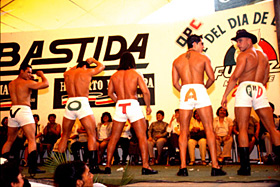 |
 |
 |
 News Around the Republic of Mexico | November 2005 News Around the Republic of Mexico | November 2005  
Mexico's Expatriate Voting Plan a Flop So Far
 Catherine Bremer - Reuters Catherine Bremer - Reuters


| | Mexico's electoral watchdog, IFE, says it hopes to see more registrations in December as it starts distributing application forms at Mexican sporting events and rock concerts in the United States or via U.S. companies employing Mexicans. |
Mexico City - A drive to get millions of Mexican immigrants in the United States to vote in the 2006 presidential election has fallen flat so far, with just 2,213 registered to vote, electoral officials said on Thursday.

The Mexican Congress approved an expatriate voting plan in June giving Mexican expatriates, who send billions of dollars home each year in remittances, the right to a voice in an election at home for the first time.

Activists predicted then that some 500,000 Mexican residents abroad would vote in next July's poll.

But nearly two months after voting forms became available in the United States, and with the Jan. 15 registration deadline looming, only a tiny fraction of the 2.3 million forms sent out have been filled in and returned to Mexico, the Federal Election Institute said.

"The figure is a bit pessimistic," said Gerardo Albino, a human rights consultant for Mexicans in the United States and member of a group that pushed for expatriate voting rights.

"But considering we are talking about a reform that was passed barely five months ago, if we get 3,000 people registered then for us it will be a success, because it will mean we have succeeded in opening the door," he said.

Proponents of the plan say new efforts to attract voters by distributing voting forms more widely and trying to catch Mexican immigrants traveling home for Christmas will mean a surge in registrations over December.

A survey earlier this year by the Washington-based Pew Hispanic Center found that 87 percent of Mexican immigrants planned to apply for absentee ballots.

But only a tiny trickle have made the trip to consulates to get application forms, many thought to be put off by the time involved or the cost of posting the form by certified mail.

Time, Hassle And Cost

Mexicans can apply to vote regardless of their immigration status, but the large number who entered the United States illegally may still shy away from drawing attention to themselves by registering.

And the millions working as waiters, hotel cleaners or fruit pickers are unlikely to be able to get time off work to travel to a Consulate and wait in line for a form.

"For someone who is working, you are losing more than a couple of hours," Albino said.

"There is always a huge crowd of people at Mexican consulates in the United States. It's not just the time you take to get there but also the time you lose waiting to get to the area where the forms are."

Mexico's electoral watchdog, IFE, says it hopes to see more registrations in December as it starts distributing application forms at Mexican sporting events and rock concerts in the United States or via U.S. companies employing Mexicans.

Stands will also be set up along the border to catch some 1.5 million Mexicans expected to head home for Christmas, and officials will remind them to fetch their voting cards.

There are more than 10 million Mexicans working in the United States. Remittances, expected to reach a record $20 billion this year, are Mexico's second-biggest source of foreign exchange after oil exports.

Mexico, which broke free from 71 years of one-party rule in 2000, will elect a new president and Congress in July 2006.

A leftist former mayor, Andres Manuel Lopez Obrador, has led opinion polls for the presidential race for two years but has begun to lose support as rival candidates crank up their campaigns. | 
 | |
 |



